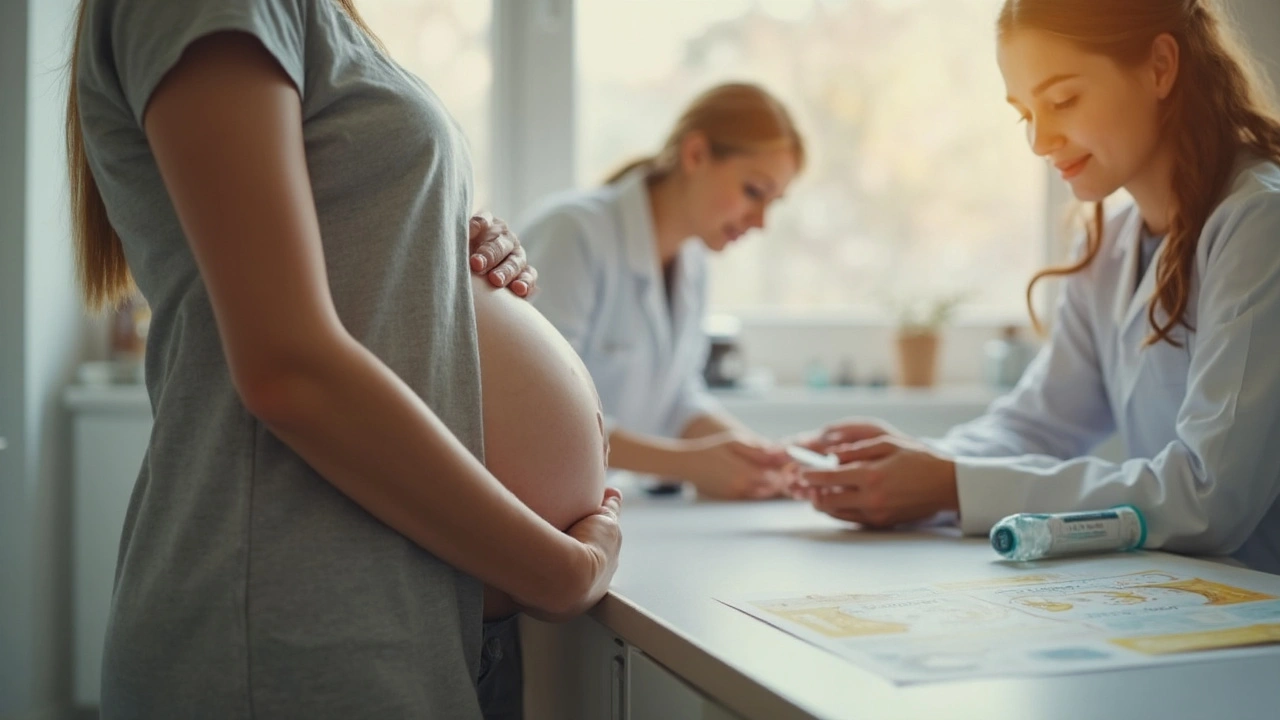Did you know that up to a quarter of people worldwide get infected with parasitic worms at some point? In the UK, we might not talk about it in every antenatal class, but deworming during pregnancy is a real concern—especially in communities with international roots or frequent travellers. Dodgy tap water, soil, or that one undercooked sausage from a food fest… all can invite worms to the party, and suddenly, you’re fretting about more than just morning sickness.
Why Deworming Matters: Risks, Myths & Pressing Questions for Pregnancy
Ignoring worms isn’t a harmless choice. Hookworms and roundworms don’t just hijack nutrients; untreated infections can cause anaemia, which in pregnancy can snowball into low birth weight or preterm birth. Anaemia is a big deal—NHS figures show about 2 in 5 pregnant women in the UK get anaemic, and while low iron is common, chronic infections can worsen it in sneaky ways. There’s also the itch factor, poor sleep, nausea, and the sheer dirtiness of the whole thing.
Prenatal myths run wild: ‘Treating worms will harm the baby.’ ‘It’s safer to wait until after delivery.’ Actually, not all medicines are equal. Timing is everything. The World Health Organization and NHS both say that in high-risk settings, safe deworming can protect mum and baby from nutritional gaps, but only if done the right way and at the right time. The worst thing is leaving a treatable problem to fester out of fear or misinformation.
Let’s talk about the elephant in the room: What happens if you just ignore it? Some mild infections may resolve, but heavy infestations can silently steal nutrients, tank your haemoglobin, and even cause pregnancy complications. And yes, threadworms and pinworms really will keep you awake at night itching.
So, the question isn’t if, but when and how to deworm safely. And what tests do you actually need?
First Trimester: Playing It Safe & Running Essential Tests
Here’s the wild part—during the first trimester (weeks 1–12), your baby’s all organs are forming. This means doctors get especially jumpy about anything that could disrupt development. Most antiparasitic drugs aren’t recommended for this critical stage because certain medicines showed risk of birth defects in animal studies. This doesn’t mean you’re helpless; if you suspect you’ve picked up something (itchy bum, unexplained cough, weird rashes, or GI upset), get it checked without delay.
Your GP or midwife will usually recommend stool sample tests. They’re not glamorous, but they’re straightforward. The lab can spot eggs from roundworms, hookworms, or whipworms. Blood tests may be ordered if you’ve been in places known for stronger parasites like schistosomiasis or toxoplasmosis, especially if you’ve had travel or lived abroad.
Here’s what matters most in the first trimester:
- No deworming medicines unless it's an emergency and decided by a specialist.
- Daily hygiene upgrades: scrub hands, keep nails short, wash veggies, and clean toilet seats.
- Alert your provider if itch, anaemia, or GI symptoms spike.
- If you’re anaemic, get iron levels checked and rule out worms as part of the workup, especially if you can’t explain the low numbers.
- Travel history matters: just back from India, Africa, or South America? Share details, don’t be shy.
Did your friend or sister take medicine early on and have a healthy baby? Good for them, but stick to medical advice—there are safer times to treat, and risk just isn’t worth it during organ formation unless absolutely urgent.
Here’s one more tip: the NHS rarely does parasite screening for all pregnant women, so you need to ask for tests if you have symptoms or risk factors. It’s never cheeky—it’s your health on the line.

Second and Third Trimesters: Timing Treatments and Staying Proactive
The story changes after week 13. This is when, for most women in high-risk groups (recent immigrants, refugees, rural areas, persistent symptoms), a discussion about safe treatments enters the picture. The difference? Major organ development is mostly wrapped up, so the theoretical risk from medicines drops. WHO recommends deworming in the second or third trimester when appropriate, using specific drugs only.
Albendazole and mebendazole are the two heavy smashers against intestinal worms, but caution still reigns—use only after 13 weeks and ideally when symptoms are bothersome or infection is confirmed. Want the nitty-gritty? Recent data from a 2023 review backed targeted use in the later trimesters, noting big improvements for mum’s iron, baby growth, and fewer pregnancy complications.
If you want extra details about albendazole during pregnancy, you can get legitimate, science-backed advice from that specific source. Don’t rely on hearsay, WhatsApp aunties, or random TikTok experts.
During the second and third trimesters, here’s how the safe deworming timeline usually looks like:
- Get a stool sample test if you have symptoms or a known risk, even if it feels like a hassle.
- If positive, talk with your provider about treatment options. Don’t self-medicate or buy meds online.
- If treatment is needed, albendazole or mebendazole may be offered after the 13-week mark, with the dose based on species and severity.
- Some worm infestations (like tapeworms) may need specialist advice—don’t accept a one-size-fits-all answer.
- After treatment, repeat tests if you’re still feeling rubbish or if your iron doesn’t bounce back.
- Keep on top of hygiene: re-infection rates after treatment can reach 50% in some studies, thanks to reinfection from family members, pets, or contaminated food.
Pregnant in Bristol and got questions? You’re not alone. Don’t wait for your next midwife session to mention symptoms. If anything feels off—tummy upsets, unexplained weight loss, rashes—raise it early.
Practical Prevention: Home, Food & Family Tips from Trimester to Trimester
Here’s where everyday actions matter as much as any pill. Preventing worm infections isn’t just about dodging “bad” countries or suspect street food. Kids at nursery can pass pinworms; well-meaning relatives can bring home garden-grown veggies that haven’t been washed enough. The best defence is a combo of smart home habits, food safety, and a little honest-to-goodness paranoia (the right kind—the useful, clean-hands sort).
- Wash hands after using the loo, before and after meals, and after gardening. Nail brushes work wonders, especially for claw-happy toddlers.
- Boil or filter water if you’re unsure about the source, especially after travel or in old houses with dodgy pipes.
- Cook meat thoroughly—no more pink sausages, no matter how tempting at summer BBQs.
- Wash fruits and veg, even if labelled 'triple-washed'. Pesticides don’t kill worm eggs.
- Clip everyone’s nails short. Parasite eggs love hiding under nails.
- High-temp laundry for bedding and towels after treatment—kills eggs, ends the cycle.
- Family-wide treatment may be needed for things like threadworm, as reinfection is maddeningly common.
Keep a diary if you’re forgetful—who took medicine, when, and any symptoms. Easy to share if you’re in and out of clinics, and handy if your memory’s shot due to ‘baby brain’.
A quick glance at recent UK data, in a handy table, shows how deworming stacks up by trimester and what’s usually recommended:
| Trimester | Deworming Medicine | Testing Recommended | Notes |
|---|---|---|---|
| First (Weeks 1-12) | Not recommended | Stool, blood tests if at risk | Only in emergencies, ideally delayed |
| Second (Weeks 13-27) | Albendazole or Mebendazole (selected cases) | Stool sample if symptoms or exposure | Safe if indicated, doctor’s advice only |
| Third (Weeks 28-birth) | Albendazole or Mebendazole (selected cases) | Repeat test if persistent symptoms | Monitor iron, family hygiene crucial |
The golden rule? Deworming in pregnancy isn’t about being reckless or overly cautious. It’s about knowing when the risks of infection outweigh the risks of treatment, and taking action at the safe moments—usually after the first 12 weeks. The deworming in pregnancy conversation is best had early and honestly. Push for tests if you have risk factors, trust your gut about symptoms, and follow trusted medical guidance. You can have a happy, healthy, and itch-free pregnancy with a few smart moves and the right timeline.


James Lee
July 17, 2025 AT 22:53Ok first off, lemme just say this article feels like a few too many buzzwords thrown together, ya know? Deworming during pregnancy, sure it's important, but they kinda gloss over how common it really is in, like, developed countries vs elsewhere. I guess it's cool that they lay out trimester-by-trimester stuff, but I personally would've liked a bit more on the risks of not treating at all. Also, where are the actual stats? Seems like a lotta vague 'expert-backed' claims without the data to back em.
Plus the drug safety bit? Spoiler: nothing in pregnancy is 100% safe, it's always balancing risks. So I'm left wondering if this is just rehashing what OBs already say? Maybe I'd feel different if they had some concrete numbers or real patient stories. But hey, at least it’s clearer on testing stages. Could’ve been a thorough article, ended up being just, meh, surface level from my view.
Kasey Lauren
July 21, 2025 AT 04:40Wow, I really appreciated the clear structure this article provides! Sometimes it’s super confusing knowing what’s safe during pregnancy, especially when it comes to things like deworming which aren't talked about enough. The trimester-specific advice and practical tips truly help make it less scary for expecting moms. And the emphasis on testing first rather than just taking meds blindly is so important.
Honestly, the reassurance about risks for mom and baby made me feel a lot better. It’s nice to see real facts instead of panic-inducing rumors. This feels like one of those small but crucial things that deserve attention because parasites can be so overlooked.
Anyone here had experience dealing with this during pregnancy? Would love to hear stories!
Dennis Scholing
July 23, 2025 AT 17:46Greetings to all. I must say that the article on deworming during pregnancy is both timely and informative. It is paramount that we approach the subject with the utmost care and evidence-based prudence. The delineation of safe treatment by trimester truly aids in minimizing risks to both mother and child.
Moreover, I appreciate how the piece encourages consultation and testing rather than self-medication. It is essential that healthcare providers be engaged as partners in this process. I would add that community awareness and education about parasitic infections must continue to be a priority, especially in regions where such infections are endemic.
Does anyone have recommendations for additional resources or guidelines that align with the recommendations presented here?
joshua Dangerfield
July 27, 2025 AT 05:06I just wanted to add that from what I’ve read and researched, testing first is huge. A lot of people just skip straight to meds but some dewormers aren’t recommended in certain pregnancy stages which can have serious consequences. So this article’s guidance on testing during each trimester is legit super useful.
Also, understanding which drugs are safest helps avoid unnecessary panic. The article even helps spot when deworming might not be urgent or needed. That level of precision is really good for minimizing any potential risks.
Has anyone else encountered hesitancy from their doctors about deworming during pregnancy? I feel like there’s occasionally conflicting info floating around.
Abhimanyu Singh Rathore
July 30, 2025 AT 16:26Fantastic read!! Seriously - the attention to WHEN and HOW is so critical cuz i’ve seen pregnant women get confused with all the jibber-jabber floating around. The way it breaks down trimester testing is lifesaving! Also, it went sooooo in-depth about the actual risks of parasites which people usually ignore. Love learning stuff rather than guessing.
One teeny gripe tho is the punctuation. There are way too many commas and some sentences just run-on for no reason... like bro, less is more sometimes! But beyond that it’s pretty supportive and friendly.
Question for anyone - how aggressive should we be about parasites in places with different sanitation standards? Do the safety protocols differ much globally?
Lynn Kline
August 3, 2025 AT 03:46Oh my gosh, this article is such a breath of fresh air! The colorful clarity and zest with which it dismantles myths surrounding deworming during pregnancy is just ❤️❤️. Having coached expectant mothers, I can attest to the fear and misinformation circulating in these areas. The trimester-by-trimester breakdown is like a vibrant roadmap to safe motherhood, sprinkled with just the right amount of scientific wisdom & practical magic.✨✨✨
The emphasis on testing first and the gentle reassurance about "real risks" make this a masterpiece in supportive maternal health education. Highly recommend sharing this gem far and wide—every pregnant queen deserves this knowledge!!! 👑🌸💊
Rin Jan
August 6, 2025 AT 15:06Ok so here’s the thing - parasites during pregnancy, they might seem minor but can cause a whole storm if unchecked, yeah? This article nails how to approach it with caution and empathy for both mum and bub. I feel it also subtly calls out the over-medicalization trends by encouraging proper testing first.
The practical tips are gold. I do wonder tho - how do you balance in areas where parasite exposure is unavoidable and constant? The psychological toll on mums fearing for their babies has to be acknowledged too, right? I felt the piece could have been a bit more human in addressing those emotional stresses.
Overall though, very solid write-up that I’d pass on to my circle confidently.
Jessica Taranto
August 10, 2025 AT 02:26Thank you all for these thoughtful insights! As someone who's gone through pregnancy recently, I found that navigating deworming advice was terrifying without reliable info. This article helped me ask the right questions at my OB appointments, especially about testing in different trimesters.
I do wonder about accessibility though - testing and safe treatments might not be within everyone’s reach. How might we improve education and healthcare access so that all pregnant women get this knowledge and care?
Looking forward to hearing more personal experiences and expert recommendations here. This community’s support means so much during such vulnerable times.
janvi patel
August 13, 2025 AT 13:46Honestly, I think this whole focus on deworming during pregnancy is a bit overblown for the majority. In most urban areas with better sanitation, parasite infections during pregnancy simply are not that big a problem. The article seems to push patients toward a heightened state of medical concern unnecessarily.
Also, while testing can be helpful, the stress and expense from repeated tests can outweigh the perceived benefits for many women. Of course, in some low-resource or rural settings this might differ, but the general tone seems alarmist to me. Better safe than sorry is understandable yet sometimes less is more.
Who else feels like pregnancy advice nowadays is just getting too invasive?
Adele Joablife
August 15, 2025 AT 21:20This article certainly offers a valuable framework, but I can't help but notice a lack of critical engagement with the pharmaceutical industry's influence on dewormer availability and promoted safety claims during pregnancy. There’s often too much blind trust in medical products without due scrutiny of motives behind their marketing.
Pregnancy is such a vulnerable period; skepticism tempered with empowerment is necessary to avoid potentially unnecessary or even harmful treatments. I encourage readers to consult multiple expert sources and question the procedures suggested.
Has anyone else looked into alternative or traditional remedies for parasite management during pregnancy? Would appreciate thoughts.
Dennis Scholing
August 16, 2025 AT 22:53Thank you for raising such a crucial point! A balanced perspective indeed requires considering various approaches. Integrative care models that incorporate evidence-based complementary methods might serve patients well, especially when conventional medications pose challenges.
Regardless of the method chosen, the overarching priority must remain the safety and well-being of both mother and unborn child. Open dialogue between patients and providers about concerns — including the financial and emotional costs — should be encouraged to tailor individualized care plans.